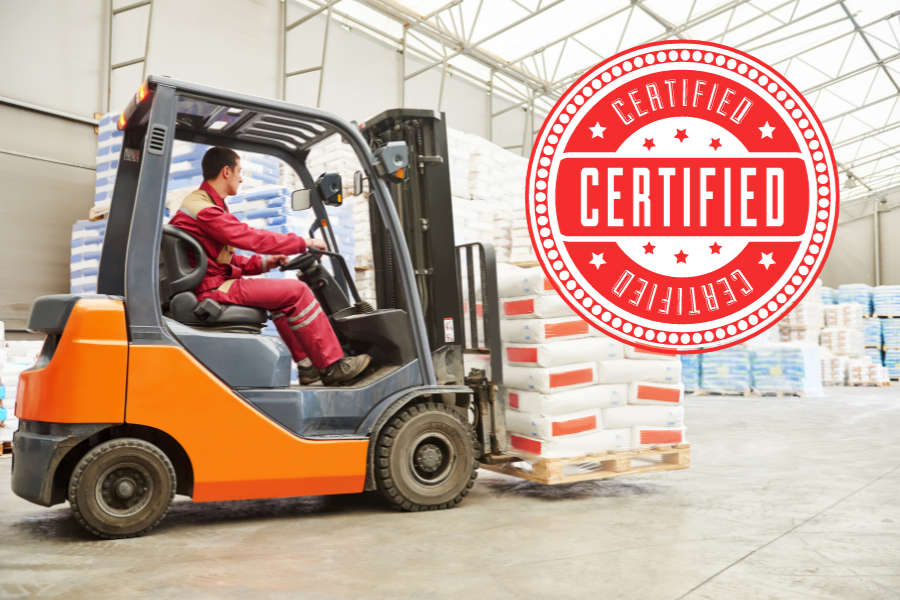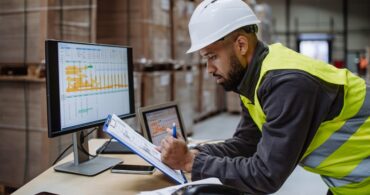Operating a forklift is an incredibly lucrative and rewarding career. However, someone can’t expect to just jump on one of these complex machines and master the mechanics. It is crucial for the safety of the driver, other employees and the entire workplace that operators become forklift certified.
Of all the jobs in a warehouse, forklift operator looks like it is the most fun (just check out any forklift meme). However, it is also a job with many risks. According to the Occupational Safety and Health Administration (OSHA), nearly 100,000 forklift accidents occur yearly. OSHA research also found that untrained forklift operators are more likely to be involved in workplace accidents and that proper training can “prevent 11 deaths and 9,422 injuries per year.”
It makes sense. When someone doesn’t know how to perform a task, they are more likely to be bad at it. So, when someone is bad at driving a forklift, they are more likely to smash into things, like shelving and people. The good news is that the reverse is also true. When someone is skilled at operating a forklift, they are more likely to maintain a safe working environment and avoid accidents.
Anyone interested in earning a forklift certification likely has many questions about the process. Well, you’re in the right place, because here are answers to some commonly asked queries.
How long does it take to get a forklift certification?
It is not too time-consuming to earn a forklift certification. However, there is no universal forklift certification. That’s because OSHA requires everyone who operates a forklift to be certified to operate the specific machine they intend to use. This is because every type of forklift is different and even the same style of machine will operate slightly differently based on the manufacturer.
According to OSHA classifications, there are seven different types of forklifts.
- Class I: Electric motor rider trucks—Counterbalanced forklifts powered by an industrial battery. These vehicles are what most people picture when they think of a forklift.
- Class II: Electric motor narrow aisle trucks—These machines are designed for small spaces and narrow aisles. Examples include order pickers, side loaders and reach forklifts.
- Class III: Electric motor hand trucks or hand/rider trucks—Designed for moving pallets a short distance, these vehicles only lift loads a few inches off the ground. Typically, an operator walks behind the machine and controls it with a long handle and hand control.
- Class IV: Internal combustion engine trucks with solid/cushion tires—These machines resemble Class I forklifts, except they are powered by diesel, gasoline, liquid propane fuel or compressed natural gas. They are primarily used indoors, even though they emit exhaust fumes.
- Class V: Internal combustion engine trucks with pneumatic tires—These vehicles also run on diesel, gasoline, liquid propane fuel or compressed natural gas and are predominately used outdoors.
- Class VI: Electric and internal combustion engine tractors—Known as tuggers, these vehicles pull cargo instead of lifting it. They are equipped with internal combustion engines for outdoor use and battery-powered electric motors when used indoors.
- Class VII: Rough terrain forklift trucks—Designed to operate outdoors on uneven terrain, these vehicles typically have at least two large tires with thick treads to help maintain stability. These vehicles generally lift between 6,000 and 12,000 pounds, with some machines lifting as much as 60,000.
So, when someone starts a new job, not only is it likely that their employer will have them take a forklift certification course, even if they have been trained on similar machines recently, but it is also the law, according to the Texas Department of Insurance. “It is the sole responsibility of the employer to certify that each operator has been trained and evaluated as required by the standard. Outside sources may be used to deliver training or even develop the PIT (powered industrial trucks) program, but only the employer is allowed to certify their PIT operators.”
There are two options for forklift certification courses, online and in-person, split into two portions: classroom and hands-on training. The classroom portion is usually completed in six to eight hours. It includes lectures, videos, written material and interactive learning. The final classroom element is a written exam. You must pass the exam before moving to the second portion of forklift certification.
An online course may cost less, but that’s because most in-person courses offer a second day of hands-on training. However, if you take an online course, you may be able to complete the hands-on portion with a supervisor at your job site. Once the reviewer approves your hands-on performance, you will receive your certification.
How long do forklift certifications last?
Another common forklift certification question, “How long is a forklift certification good for?” is somewhat tricky.
This is because someone’s forklift certification does not “expire.” However, OSHA has established when a forklift operator needs to update their skills. At a minimum, a forklift operator is required to take a refresher training course and undergo an evaluation every three years.
There are also instances that may require an operator to take a refresher course sooner than three years. Some possibilities include:
- The operator was observed operating the vehicle in an unsafe manner.
- The operator was involved in an accident or a near-miss incident.
- The operator has received a negative evaluation.
- The operator is assigned to drive a different type of industrial truck.
- Workplace condition changes that impact the safe operation of the forklift.
Do you need a license to drive a forklift?
For anyone wondering how to get the forklift license, we have some good(ish) news. There is no such thing as a forklift license. Only vehicles that are driven on public roads require a license to operate.
However, even though there is no official “forklift license,” you still need to obtain a forklift certification before operating any industrial truck.
Do you need a driver license to drive a forklift?
Similar to the above issue, “Do you need a drivers license to drive a forklift?” is a frequent forklift certification query. Short answer: “yes” with an “if.” Long answer: “no” with a “but.”
You only need a forklift certification to operate a forklift. You do not need a state-issued commercial vehicle license to drive a forklift. For example, if someone’s state-issued driver’s license becomes suspended, they can still take a bus or get a ride to work and drive a forklift for the duration of their shift.
However, companies can establish additional rules regarding a driver’s license. It may be company policy that forklift operators must have a state-issued driver’s license in addition to a forklift certification. Forklift operators need to know and follow their company’s guidelines.
How old must you be to operate a forklift?
OSHA has youth employment regulations regarding potentially hazardous occupations that are based on the Fair Labor Standards Act. These regulations prohibit anyone under 18 from operating power-driven hoisting apparatus, such as forklifts. The only exception is certain agricultural operations, to account for small, family-owned farms where the entire family has responsibilities. In these instances, 16 is the minimum age for hazardous farm tasks.
What does forklift certified mean?
Well, being forklift certified may mean different things to different people. At its most straightforward, forklift certified means that someone has passed the training program by acquiring theoretical knowledge through classroom study, obtaining practical skills through hands-on training and passing the evaluation to earn a forklift certification.
However, forklift certification can also be a point of pride for an operator meaning someone is allowed to operate one of the coolest machines at their job site.
There are many questions surrounding a forklift certification, “How long does it take to get forklift certified?” and “How long does forklift certification last?” are just a few. Fortunately, you now have the answers to these questions and many more.
Once someone earns their forklift certification, they must ensure their truck is ready to roll during every shift. To keep your fleet up and running and for all of your forklift battery needs, please give Texas Motive Solutions a call at (888) 316-2459. We offer a complimentary forklift fleet performance analysis to guarantee you have the correct batteries for your needs, and our forklift maintenance programs help keep your fleet operating at its highest performance.
Please fill out this form to learn about our services and discover everything Texas Motive Solutions can do for you.



